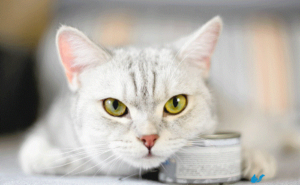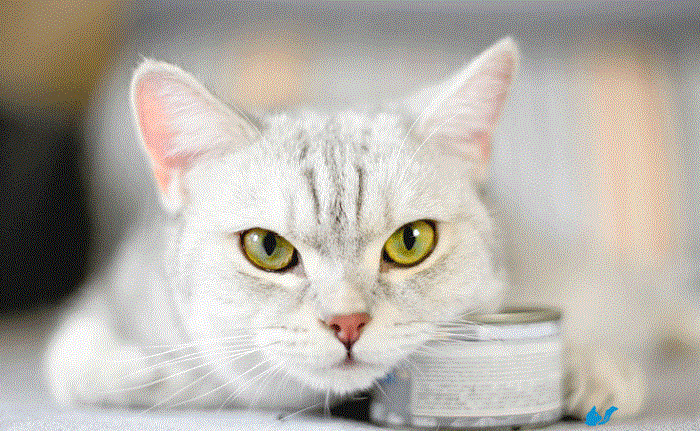Cats are known for their love of fish, and many cat owners wonder if they can feed their feline friends canned fish as a treat or as part of their regular diet. While canned fish can be a convenient and tasty option for cats, it is essential to understand the potential benefits and risks associated with this type of food. In this article, we will explore whether cats can eat canned fish, if it is harmful to them, and what precautions should be taken when feeding it to them.

1. Can Cats Eat Canned Fish?
The short answer is yes, cats can eat canned fish. In fact, many canned fish products are specifically produced for cats and marketed as a healthy and tasty option for them. However, not all canned fish products are created equal, and it is crucial to choose high-quality, safe options suitable for cats.
Types of Canned Fish Suitable for Cats
When it comes to choosing canned fish for your cat, there are a few things to keep in mind. First, make sure that the product is specifically labeled for cats. This means that it has been formulated with the nutritional needs of cats in mind and does not contain any ingredients that may be harmful to them.
Secondly, opt for canned fish that is packed in water or its natural juices rather than oil. Oil-packed fish can be high in fat and calories, which can lead to weight gain and other health issues in cats.
Lastly, avoid canned fish that contains added salt or seasonings. These can be harmful to cats and may cause digestive upset or other health problems.
Some common types of canned fish that are suitable for cats include:
- Tuna
- Salmon
- Sardines
- Mackerel
- Whitefish
2. Do Cats Like Canned Fish?
In general, cats are attracted to the rich, fishy flavor of most canned fish. However, just like humans, cats have their own preferences and may not enjoy all types of canned fish. Some cats may also have sensitivities or allergies to certain ingredients found in canned fish, which can affect their enjoyment of it.
Factors That May Affect a Cat’s Preference for Canned Fish
- Age: Older cats may have a decreased sense of taste and smell, making them less interested in canned fish.
- Health conditions: Cats with underlying health issues may have a decreased appetite and may not be as interested in canned fish.
- Previous experiences: If a cat has had a negative experience with a particular type of canned fish, they may be less likely to enjoy it in the future.
3. Benefits of Feeding Canned Fish to Cats

When chosen wisely and fed in moderation, canned fish can offer several benefits to cats. It can be a good source of protein, omega-3 fatty acids, and low in carbohydrates, contributing to their overall health and well-being.
Protein
Cats are obligate carnivores, meaning that they require meat in their diet to thrive. Canned fish is an excellent source of high-quality protein, which is essential for maintaining strong muscles, healthy skin and coat, and a robust immune system.
Omega-3 Fatty Acids
Fish, especially oily fish like salmon and sardines, are rich in omega-3 fatty acids. These essential fatty acids play a crucial role in maintaining a cat’s overall health, including:
- Promoting a healthy heart and cardiovascular system
- Supporting brain development and cognitive function
- Reducing inflammation and supporting joint health
- Improving skin and coat health
Low in Carbohydrates
Cats have a limited ability to digest carbohydrates, and a diet high in carbs can lead to obesity, diabetes, and other health issues. Canned fish is low in carbohydrates, making it a suitable option for cats who need to watch their carb intake.
4. Can Canned Fish Be Harmful to Cats?
While canned fish can offer several benefits to cats, it can also be harmful if not selected carefully or fed in excess. Some potential risks associated with feeding canned fish to cats include:
Mercury Poisoning
Excessive consumption of tuna in canned form can lead to mercury poisoning in cats. Mercury is a toxic heavy metal that can accumulate in the body over time and cause various health problems, including:
- Abdominal pain
- Tremors
- Lethargy
- Decreased appetite
- Neurological issues
To avoid this, it is essential to limit your cat’s intake of tuna and opt for other types of canned fish instead.
Nutrient Imbalance
Feeding canned fish as a significant part of a cat’s diet can lead to nutrient imbalances. While canned fish is high in protein and omega-3 fatty acids, it is low in other essential nutrients like calcium, vitamin E, and taurine. A diet lacking in these nutrients can lead to health problems in cats, such as heart disease, vision issues, and reproductive problems.
Urinary Tract Infections

Cats are prone to urinary tract infections (UTIs), and some types of canned fish can contribute to this issue. For instance, fish packed in oil can be high in magnesium, which can increase the risk of UTIs in cats. Additionally, some cats may be sensitive to certain ingredients found in canned fish, leading to inflammation and irritation in the urinary tract.
Allergic Reactions
Some cats may be allergic to certain ingredients found in canned fish, such as preservatives, flavorings, or even the fish itself. If your cat has an allergic reaction to canned fish, they may experience symptoms like vomiting, diarrhea, loss of appetite, fever, skin irritation, and hair loss.
5. Precautions When Feeding Canned Fish to Cats
Before introducing canned fish into your cat’s diet, it is essential to consult with a veterinarian, especially if they have underlying health conditions. Your vet can advise you on the appropriate type of canned fish for your cat and how much to feed them based on their age, weight, and overall health.
If approved, follow the veterinarian’s recommended dosage and frequency. It is also crucial to monitor your cat’s reaction to the canned fish and watch out for any signs of adverse effects. If your cat shows any symptoms of an allergic reaction or other health issues, stop feeding them canned fish immediately and consult with your vet.
Conclusion
In conclusion, cats can eat canned fish, but it is essential to choose high-quality, safe options and feed it in moderation. Canned fish can offer several benefits to cats, such as being a good source of protein and omega-3 fatty acids. However, it can also be harmful if not selected carefully or fed in excess, leading to issues like mercury poisoning, nutrient imbalances, urinary tract infections, and allergic reactions. Consult with a veterinarian before introducing canned fish into your cat’s diet, and always monitor their reaction to it. With proper precautions, canned fish can be a tasty and healthy addition to your cat’s diet.
